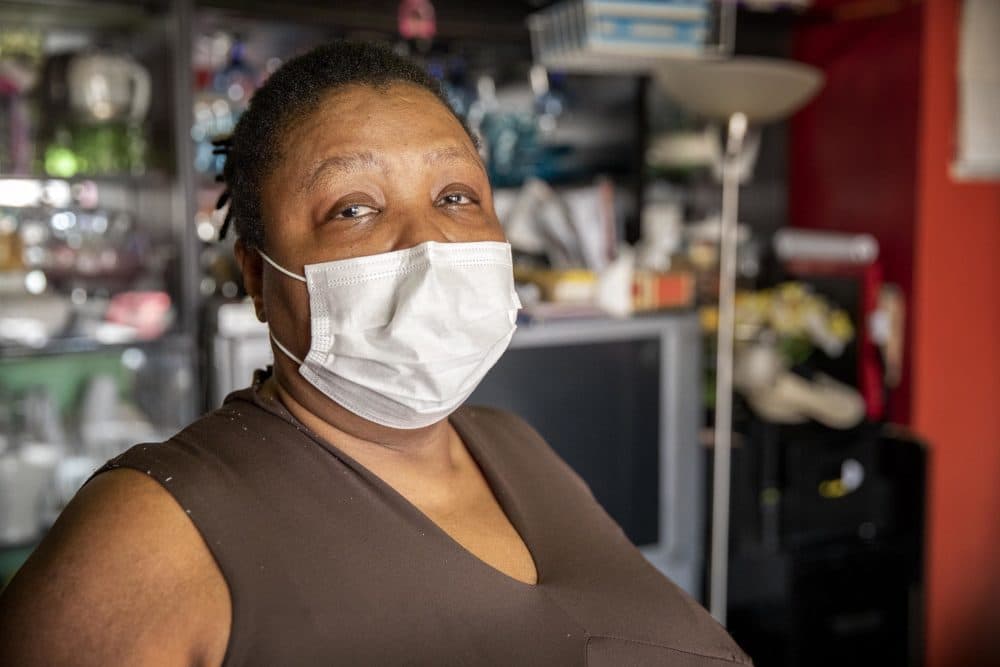Advertisement
State's Emergency Rent Program Is Understaffed And Overwhelmed, Housing Advocates Say

It’s a weekday afternoon at the Archdale Village public housing development in Roslindale, and Margareth Joseph is still recovering from another nearly sleepless night.
Joseph, who's 60, has lived for 30 years in a two-bedroom apartment here. Now she shares it with her two daughters, and their two kids—all five living on the less-than-$1,000 social security checks Joseph gets each month. Her daughters lost their jobs at the beginning of the pandemic, and haven’t been able to go back to work.
Joseph said she owes $6,000 in back rent, and she’s afraid of getting evicted. She’s been waiting for months to hear whether she will get any help from the state's Residential Assistance for Families in Transition (RAFT) program.
"That will do me a lot of good, because...I don't sleep at night," she said. "I don't, because I keep on thinking, 'When is it going to be the day they going to put me out in the street with my grandkids?' And that will kill me."
A spokesperson for Metro Housing, the nonprofit administering RAFT in the Boston area, told WBUR that Joseph was approved to receive $2,400—and the money went out in late September.
But Joseph and her lawyer say she was not informed that she had been awarded money under RAFT. They also say that the landlord received the money without knowing who it was for. It was only when WBUR inquired about the money that Joseph learned it had been awarded.
Joseph's attorney, Melanie Gleason of Lawyers for Civil Rights, said that the confusion surrounding Joseph’s case isn’t unique, because of the huge demands now being placed on RAFT.
"I think there are tenants who have been counting on these funds and have applied, way back when, in the summer and in July, even beforehand," she said. "And they still haven't seen that money. And they are understandably—now that the [eviction] moratorium is lifted—wondering what's next for them.”
I keep on thinking, "When is it going to be the day they going to put me out in the street with my grandkids?" And that will kill me.
Margareth Joseph
The state is relying on RAFT to help renters during the pandemic, and the nonprofit is being criticized for long delays and mounting uncertainty.
Gov. Charlie Baker recently announced $100 million in emergency funds for RAFT—upping the maximum household benefit from $4,000 to $10,000 per year during the pandemic. But Baker also said he wouldn’t extend the moratorium on evictions.
The money is being administered by nine regional organizations across Massachusetts. The executive director of Metro Housing Boston, Chris Norris, said RAFT is the cornerstone of the state’s eviction-prevention effort. But he said his group is too understaffed to deal with the demand they’re facing, and the application process is more complicated than it needs to be.
"Our focus should be on serving as many people as possible, as quickly as possible with the funds that they need to remain housed," Norris said. "And unfortunately, the way the system is currently set up, we have restriction after restriction after restriction—and documentation after documentation after documentation—and it makes it extremely difficult for someone to navigate their way through it.”
Advertisement
Case in point: Norris said Metro Housing received 25 RAFT applications one day last week. Only two of them were filled out completely.
We have the pandemic on top of a pre-existing housing crisis
Andrea Park
RAFT has been in place for 15 years, but its original intention was to provide short-term help to get renters out of a tough spot. Now more people need more assistance over longer periods of time.
Norris said that over the first three months of the pandemic he saw as much demand as in the entire previous year.
Andrea Park, an attorney at the Mass Law Reform Institute, said she expects the state will soon see a tidal wave of evictions in court. And she said RAFT alone isn’t enough to prevent that.
"We have the pandemic on top of a pre-existing housing crisis," Park said. "And to say that we will help all of those people who I think of as being akin to victims of a natural disaster…and to say that, 'First you should [face eviction], and then you should try to access this money...', It's the backwards approach."
Stefanie Coxe of the Regional Housing Network—the umbrella organization encompassing the nine regional groups that administer RAFT—said one of the most effective changes to the program would be streamlining the process by which people are granted assistance.
"One of our board members was saying their best case manager can do 10 applications a week," Coxe said. "That has nothing to do with the staff, that tells you about the hoops that you have to jump through in order to get an application approved.”
A spokesperson for the Department of Housing and Community Development, which oversees RAFT, says a more streamlined application is in the works—as well as a platform to allow landlords to engage with the program directly.
"We continue to work with partners across the state to quickly expand capacity at our RAFT administering agencies and streamline the application process in order to increase access to this critical program," the spokesperson said in a statement.
And there are signs that the additional money allocated to RAFT is helping.
On Monday, a group of landlords owning thousands of units in Massachusetts agreed to pause evictions for failure to pay rent through the end of this year. The landlords—convened by the Greater Boston Real Estate Board—will help tenants draw on RAFT money to pay back rent.
This segment aired on November 3, 2020.
